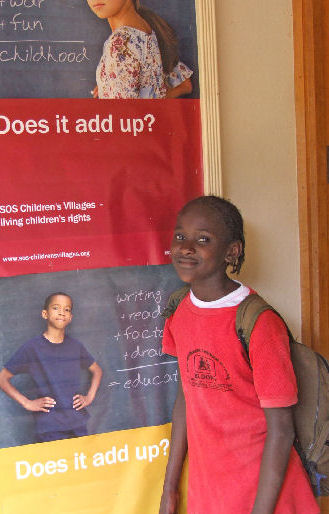Children's director reflects
11/01/2008

Peter Mungai has been the village director of SOS Children's Village Eldoret for the last 15 years. His life, and that of the children's village, has been rocked in the past two weeks by unprecedented violence in the community, following disputed election results. We asked him to tell us how the violence has affected him, his co-workers and the children of the village.
Hope is the last thing to lose
After the elections in Kenya what has been the effect on Eldoret?
Eldoret has been a fast growing town in the past five years becoming a centre for agricultural production, education, finance and industrial development. It has a modern airport that after a long period in the doldrums is seeing renewed activity with over four charter companies offering daily flights to Eldoret. The improved transport facilities, the expanding tertiary education (Moi University) facilities, the revitalisation of industries and the cosmopolitan area all played a part in the development of a good business environment which contributed to the growth of Eldoret as a hub in the North Rift region.
This growth has unfortunately been seriously damaged by chaos and post election violence directed against certain communities. The ethnic hatred led to communities taking the law into their hands and committing despicable criminal acts against compatriots. The criminal acts are leading to a mass exodus of traders from Eldoret that will have a huge negative impact on the growth of the town.
When did you first notice that things were getting bad in the town?
When they started burning houses in the neighbourhood.
You have lived in Eldoret for 15 years. Has anything like this happened before?
Yes in 1993, but not as serious as it is now.
Has anyone in the children's village been endangered?
Nobody in the village has been hurt, but some mothers (who have rural homes in Eldoret) have lost all their personal belongings.
What about the SOS youth who live outside the village? What has happened to them?
I brought all of them to our village, for they felt threatened.
Were you frightened for the children and co-workers and even yourself?
Yes, this was a matter of life and death. As for me (and being a Kikuyu*) I put up a brave face to help my staff and children to have hope. I must thank our national director Mr Castelino for his continued moral support, calling me several times in a day and sending me airtime (for mobile phone) without which communication would have been impossible. This is not a laughing matter.
How has the violence affected the day to day life of the children's village? Are you able to leave? If not how do you buy food?
Food I was getting from our friends running the supermarkets and life in the village was fine. I had to close the youth home for bigger boys in the community and brought them to the youth home hosting the younger ones located in our school.
The church burning must have been very frightening. (A church with people inside was burned and at least 35 people, including women and children, died.) What were the feelings in the village?
We felt very unsafe and our security was and is God.
Has the village been able to assist the local community in any way?
Yes, we sent clothes from the family houses and from staff to the church hosting the victims. We also sent a lot of firewood to the victims.
Has the situation improved within the last few days?
Yes.
Are there any examples you know about, of good prevailing over evil during the last week, or was it all bad?
It was bad.
What are your views about the future?
We want to stand with the children and hope for the best. The country and its people all belong to God and hope should be the last thing to lose. We ask you all to pray for us for the security we have is only God.
* The Kikuyu are Kenya's most populous ethnic group. There are about 5,347,000 Kikuyu people in Kenya, equal to about 22% of Kenya's total population. They cultivate the fertile central highlands and are also the most economically active ethnic group in Kenya. (Source: Wikipedia)
Relevant Countries: Kenya.